Generative AI is rapidly becoming a general-purpose technology for many walks of life. Its impact on marketing teams can compared to the invention of the steam engine in transportation or electricity in daily life tasks.
In a Gartner survey, 63% of marketing leaders said that they plan to invest in generative AI technology. Another study by Price Waterhouse Cooper (PWC) estimates that by 2030, generative AI will generate a revenue of $15 trillion in the global economy.
Also Read: Virtual Influencers: The Controversial Frontier of Marketing
The figures above suggest that the field of marketing is set to observe a change unlike any before. Also, the marketing industry’s traditional practices will undergo a complete transformation in the near future.
Marketing Is a Numbers Game
Marketing is not limited to the advertising material you see in the media. It takes a lot of planning, data analysis and management to finally come up with a marketing strategy for a product or service.
AI has put a gas pedal on production in every industry it is deployed in, for example, software coding. The same is the case for marketing. Marketing professionals use AI for data collection and analysis through machine learning to gain customer insights and automate marketing decision-making.

Hyper-personalization and interactivity help brands effectively capture their target audience. AI image generators also play a role in this context as they enable marketing teams to create tailor-made images in bulk. Strategies like these help businesses stand out in the crowded market, which is essential for their survival. The scale and efficiency that such AI tools provide were unimaginable a year ago.
“If you’re a company where marketing and sales is what drives the value, that’s actually where AI can create the most value.”
McKinsey.
Marketers can assess more ideas in a shorter span of time and gain deeper insights into what customers want. Based on the findings, this also helps improve customer experience, which will help generate sales, as marketers will have more time to work on customer engagement.
Brands Are Using AI for Personalization
Brands worldwide are using generative AI in their marketing strategies, each with its own unique approach. In some instances, they have generated better results for these brands in their different industries.

Nutella wanted its products to stand out at the point of sale, so it focused on packaging to make them look more desirable. An Italian branding agency, Ogilvy Italia, was tasked with designing the packaging. The agency developed nearly a dozen patterns and used AI to create 7 million one-of-a-kind designs. This was how they created Nutella Unica.
They sold all 7 million jars as soon as they reached the market.
AI can also be impactful in branding. Tools like Midjourney and DALL-E can help creative teams in cost savings, creating visuals, and rapidly putting their ideas into practice.

Coca-Cola is an old player in the advertising game. Its advertising wars with Pepsi are well known, but as times have changed, so have its marketing strategies. The company has taken a unique approach to mix AI with human ingenuity and increase user engagement.
Last year, Coca-Cola invited users to a contest called “Create Real Magic.” Users were asked to create new art material by combining its historic ad creatives with DALL-E, which was then shared on the company’s website.
This campaign brought Coca-Cola to the forefront of companies leveraging AI and helped them stay on top of new innovations.
AI’s Use in Marketing Will Increase
AI is now used more commonly in marketing practices. A study from The Conference Board noted that 87% of marketing leaders have used or experimented with AI tools, and 68% of marketing teams are now using AI in their daily work.
Also Read: Ava Labs’ Unique Marketing Strategy Sparks Debate on the Future of Blockchain Gaming
This month, Coca-Cola’s president of marketing and Europe CMO Javier Meza talked to Marketing Week, saying:
“One of the things we keep repeating in Coca-Cola is it’s about AI and HI. It’s artificial intelligence and human intelligence and ingenuity. I really believe our opportunity as humans is to continue to work on the creative side, on the values side, and use AI to scale ideas.”
The Conference Board also found that 82% of marketers surveyed expect that AI will be further adopted. They hoped that AI adoption would lead to more improvements in productivity and financial results.
According to the survey, 44% of marketing professionals noted using AI to summarize content, 41% said it helped do the legwork/inspire thinking, and 41% said it helps personalize user content. Another 30% of marketing professionals said that they use AI to produce content faster.
Meza claimed that the real revolution is yet to begin after brands use AI to redesign the systems. He said, “If I could give you one recommendation it is to go back to school and study digital, analytics, and artificial intelligence.”
Cryptopolitan reporting by Aamir Sheikh





